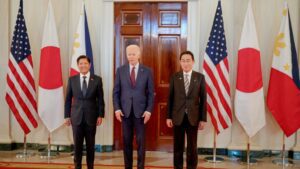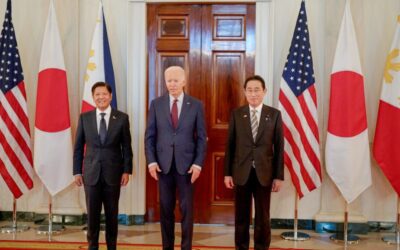Ferdinand Marcos’ widow Imelda is a member of the House of Representatives. His daughter Imee is running unopposed for reelection as governor of Ilocos Norte. His son Ferdinand Jr. is leading the pack of six candidates for Vice President – and whether or not he wins that post by May 9, it’s almost certain that he will run for President in 2022.
The Marcos family’s return to political preeminence has been 25 years in the making. It began in 1991 when the Corazon Aquino administration allowed them to return to the Philippines a scant five years after the EDSA civilian- military mutiny overthrew the Marcos terror regime in 1986. Since then they have steadily reentrenched themselves in Philippine politics and governance, initially at the provincial and local levels, and eventually at the national level in 2013 when Ferdinand Marcos Jr. won a seat in the Senate. If Ferdinand Jr. wins the vice presidency, the family would be within striking distance of returning to Malacanang in six years – or even less, should the elected president be impeached or otherwise be incapacitated between now and 2022.
The family’s political resurgence has been the subject of wonderment among observers familiar with the elder Marcos’ 21-year (1965-1986) assault on human rights and looting of the treasury, and, despite what happened during martial law and what the Marcoses did during that murderous period, Marcos Jr.’s preference ratings’ rise in survey after survey.
“Bongbong” Marcos’ candidacy has correctly become the focus of criticism for its being so obviously an attempt at returning the family to national power. But how he has managed to be the leading candidate for the vice presidency should not surprise anyone.
Through the usual backroom deals characteristic of the exclusionary and corrupt political system populated by some of the most unprincipled political operators in the planet, and with the considerable use of the billions still in their possession, the making of Marcos Jr. as governor, senator and the candidate for Vice President to beat has been a family enterprise from beginning to end, with Malacanang as the end goal. Imelda Marcos has declared often enough that her son not only should be, but also “deserves” to be, President, and has been quoted as saying that the family – which includes not only Marcos Jr . and Imee Marcos but also a nephew running for the Senate – must win these elections.
Those Filipinos truly concerned with the future of this country need to examine what went wrong in the thirty years after EDSA that made the present peril possible. Those who survived the martial law outrage bear much of the responsibility for their failure to transmit to the generations after them enough of the lessons of that period for everyone to understand the risks involved in returning to power the family of the only elected President of the country to grossly abuse that mandate. But the administrations that succeeded Marcos’ 21- year reign are even more liable.
Not only did the Aquino, Ramos, Estrada and Arroyo regimes minimize the immensity of the crimes committed against this country and its people by failing to hold those responsible accountable; they also failed to inculcate in the country’s youth the accurate and complete account of that sorry episode and its consequences that an educational system worthy of its name could have achieved. Instead that equally corruption-ridden system damaged and warped the values of an entire generation through the inaccurate and senseless textbooks and ill-equipped teachers that have not only painted a distorted picture of history but have even mislabelled the Marcos dictatorship as the country’s golden age.
But the more basic failure of the administrations that followed that of Marcos’ was their unwillingness and inability to constitute a truth commission in the manner of South Africa, Chile, Argentina and other countries that have overthrown dictatorships. Because no authoritative account of the martial law regime exists, the revisionist claim that the Marcos dictatorship was the best thing rather than the worst disaster that has ever happened to this country since 1946 is metastasizing among the uninformed sectors of Philippine society with the help of the publicists and corrupt journalists in the pay of the Marcos family.
But at the heart of the failure to hold the Marcoses accountable is the sense of the political elite that despite the often murderous divisions that occur among them, they basically share with the Marcoses the same interest in keeping the status quo intact, hence the reluctance to constitute a truth commission that could have exposed to the nation how the undemocratic and anti-people political system made the Marcos tyranny inevitable, and its repetition possible.
Equally to blame are the media. With the lessons of the martial law period still fresh, and with the considerable influence that they had in the post- 1986 period, the media organizations that had operated before martial law and which had reestablished themselves, as well as the new players in the aptly named media “industry, ” could have demanded that the reestablished rule of the old political elite hold the Marcoses accountable. The corporate media instead focused their attention on convincing the people that all was now well with Marcos gone, and with chronicling the absurdities of the elections that after 1986 were supposedly the most telling indicators of democratic rule.
The return of authoritarian rule continues to be an ever present danger because of the exclusionary character of the political system that had been restored in 1986. That system after all gave birth to Marcos and his bureaucrat-capitalist ilk. That reality demanded the democratization of that system to cleanse it of the authoritarian virus, as well as the depoliticization of the police and the military.
The coup attempts that occurred not only during the Corazon Aquino presidency but even after should have been ample enough indicators of the danger of a return to authoritarian rule through the unreformed police and military establishments and their patrons in the political system. But the media were willfully blind to it and were more focused on protecting and enhancing their own political and economic interests.
After EDSA the politicians scrambled for media attention, and the media were more than willing to provide it, in the process forgetting that their basic responsibility after 14 years without elections was to help educate the people on the intricacies and responsibilities of democratic decision-making.
The lethal combination citizen indifference, the post- martial law administrations’ unwillingness to exact accountability for the crimes of the Marcos regime, and media’s inexcusable failures has made the return of the Marcoses to power through Marcos Jr. a catastrophe waiting to happen.
To prevent it now requires the mobilization of the people in their millions, not only in the course of these elections but even after, when it will remain a constant peril in a political system ruled by a handful of families who share with the Marcoses the same fundamental interest in protecting and keeping their monopoly over political power.
Some parts of this column have appeared in the author’s “Vantage Point” column in Business World.









0 Comments